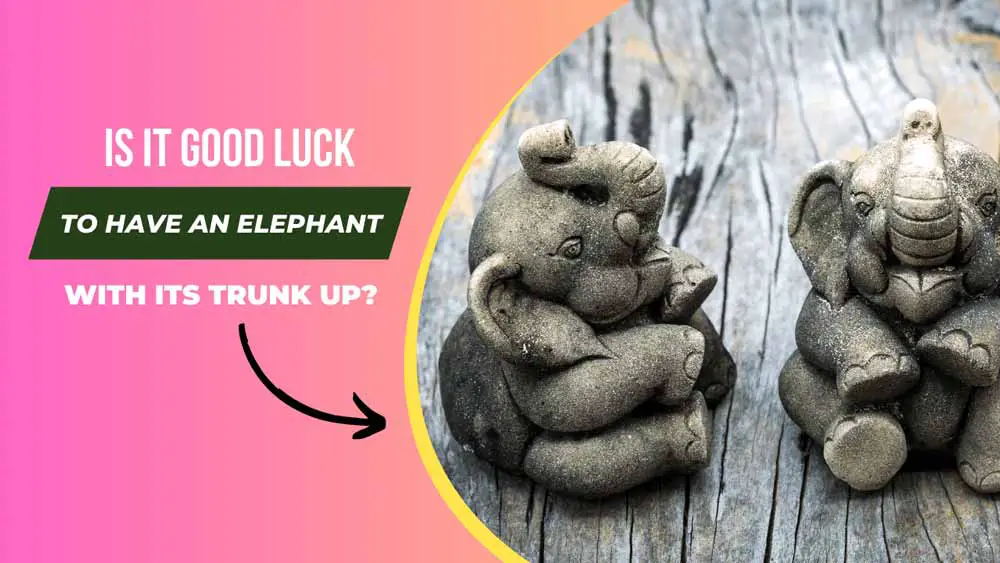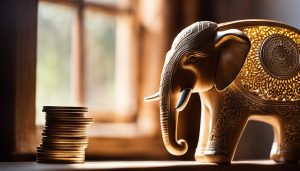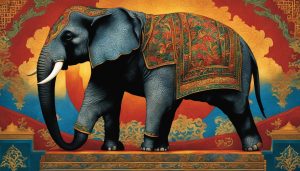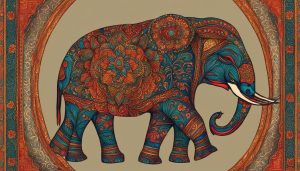Elephants, the majestic creatures of the wild, hold a special place in many cultures and traditions worldwide.
Their distinctiveness and impressive intelligence make them a source of reverence and symbolism in various societies.
One particular symbol is that of an elephant with its trunk raised—often associated with good luck, prosperity, and wisdom.
This article delves into the meaning behind this symbolism, exploring its cultural roots and benefits.
Contents
- 0.1 Elephants: A Revered Icon Across Cultures
- 0.2 1. Hindu and Buddhist Cultures
- 0.3 2. Chinese Culture
- 0.4 3. African Cultures
- 0.5 The Lucky Charm: Elephant’s Trunk
- 0.6 The Benefits of Elephant Statues:
- 0.7 1. Promotion of Good Luck and Abundance
- 0.8 2. Fostering Wisdom and Protection
- 0.9 3. Enhancing Relationships and Productivity
- 0.10 Where to Place an Elephant Statue?
- 0.11 Types of Elephant Statues and Where to Buy:
- 0.12 Conclusion: Is it Good Luck to Have an Elephant with Its Trunk Up?
- 1 FAQs
- 1.1 Why is an elephant with its trunk up considered good luck?
- 1.2 Are any particular types of elephant statues considered luckier than others?
- 1.3 Is there a specific direction the elephant statue should face for good luck?
- 1.4 Can I gift an elephant statue to someone?
- 1.5 Is there any significance to the number of elephants in a statue?
Elephants: A Revered Icon Across Cultures
In many cultures, elephants are not just animals; they are potent symbols representing different values and beliefs. These associations range from wisdom to strength, fertility to longevity, transcending time and space.
1. Hindu and Buddhist Cultures
In Hinduism and Buddhism, elephants have a significant presence. The Hindu god, Ganesha, often depicted with an elephant head, symbolizes wisdom and is known as the remover of obstacles.
Many rituals and celebrations revolve around Ganesha, showcasing the elephant’s deep-rooted significance in Hindu culture.
2. Chinese Culture
For the Chinese, elephants symbolize strength, power, and longevity. The Chinese word for elephant, ‘Xiang,’ sounds similar to the term for good luck and fortune, linking the animal to positive symbolism.
3. African Cultures
In Africa, elephants embody fertility and abundance, often associated with leaders and divinity. They are respected creatures, seen as harbingers of good fortune and prosperity.
Also read: Is it Good Luck Receiving a Buddha Statue as a Gift?
The Lucky Charm: Elephant’s Trunk
The elephant’s trunk is an organ of paramount importance for the creature—allowing them to drink, eat, bathe, and communicate. However, it’s also a potent symbol in cultural contexts, especially when positioned upwards.
Many see an elephant with its trunk raised as extending a gesture of welcome and goodwill, almost like a friendly wave.
Moreover, it is often associated with the free flow of good energy and abundance, making such a depiction a famous symbol of good luck.
The Benefits of Elephant Statues:
Elephant statues are more than mere ornamental pieces. They are believed to possess the power to bring good luck, abundance, wisdom, and protection to the spaces they inhabit. Let’s explore some of these benefits in more detail:
1. Promotion of Good Luck and Abundance
As per many cultural beliefs, having an elephant statue in your home or office can invite luck and prosperity.
2. Fostering Wisdom and Protection
Elephants, especially those with a raised trunk, are also viewed as carriers of wisdom and protectors from harm.
3. Enhancing Relationships and Productivity
Having an elephant statue can foster harmony, increase productivity, and reduce stress, leading to improved home and workplace relationships.
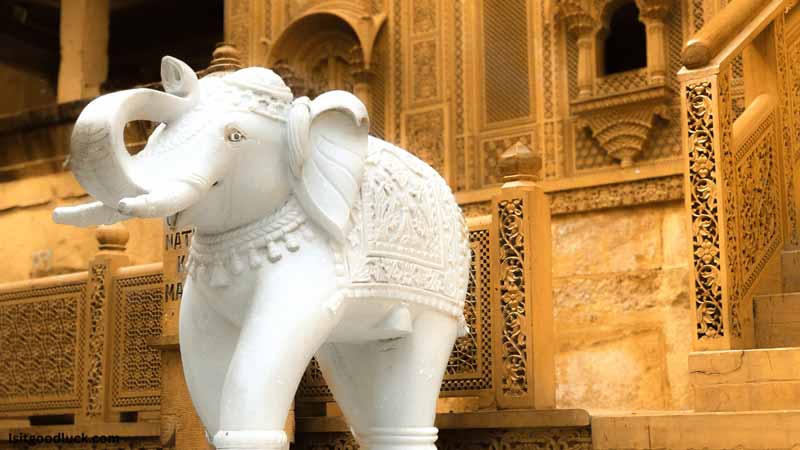
Where to Place an Elephant Statue?
The placement of an elephant statue can significantly impact the energy it brings to your space. According to Feng Shui, the elephant statue should ideally be placed at the entrance of your home or office, facing the door.
This position is believed to attract good luck and abundance. Consider putting it in your living room or bedroom to promote harmony and peace.
Types of Elephant Statues and Where to Buy:
Various types of elephant statues are available today, differing in design, size, material, and cultural significance.
When purchasing one, consider its purpose and the cultural context that resonates most. Local artisan shops, online marketplaces, and stores specializing in home décor or cultural artifacts are excellent places to find these statues.
There’s no shortage of anecdotes from people who believe in the power of elephant statues.
Some claim improved fortune after placing an elephant statue in their home or office, while others credit these statues with fostering a peaceful and harmonious environment.
Conclusion: Is it Good Luck to Have an Elephant with Its Trunk Up?
Elephants, especially those with their trunks raised, hold an intriguing place in various cultures. They embody good luck, prosperity, and wisdom.
While the elephant’s symbolism is deeply rooted in tradition and belief, its appeal resonates with contemporary society.
Whether you believe in the elephant’s power to bring good luck or appreciate its symbolism, an elephant statue could be a meaningful addition to your space.
Also read other articles regarding animals good luck
FAQs
Why is an elephant with its trunk up considered good luck?
An elephant with its trunk up symbolizes good luck because it represents various positive attributes across different cultures. This gesture signifies the free flow of good energy, welcoming good fortune and abundance in many societies. Additionally, the upward trunk symbolizes a gesture of greeting and goodwill, further strengthening its association with positive energies.
Are any particular types of elephant statues considered luckier than others?
Different cultures might have specific preferences, but generally, an elephant statue with its trunk raised is considered the luckiest. This position represents the elephant welcoming and attracting good luck. However, the perceived luckiness can also depend on the statue’s material or the individual’s belief system.
Is there a specific direction the elephant statue should face for good luck?
In Feng Shui, an elephant statue is ideally placed at the entrance of your home or office, facing the door. This position is believed to attract good luck and abundance into the space. However, this isn’t a strict rule, and what matters most is that the statue’s position feels proper and harmonious to you.
Can I gift an elephant statue to someone?
An elephant statue, particularly one with its trunk raised, can make for a thoughtful and meaningful gift. It represents a wish for good luck, abundance, and wisdom for the recipient, making it an excellent gift for housewarmings, birthdays, or other celebratory occasions.
Is there any significance to the number of elephants in a statue?
In some cultures, the number of elephants in a statue or depiction can have different meanings. A solitary elephant is often associated with individual power and independence. In contrast, two elephants can symbolize partnership and relationship harmony. Multiple elephants together can denote community strength and cooperation. However, these interpretations can vary across cultures and contexts.

